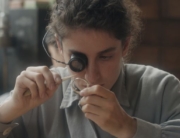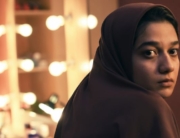Currently serving a prison sentence in his native Iran, lauded director Jafar Panahi (Taxi, This Is Not a Film) spins two and a half tales in his latest film, No Bears. None reflects well on his country’s state of mind during its current period of turmoil and demands for regime overthrow.
Panahi’s themes overlap loosely. One is the director’s stay in an out-of-the-way village on the Iran-Turkey border, with Panahi playing himself. Another is Panahi’s laborious remote filming of a feature film about a persecuted couple trying to flee to the West. And in a subtheme, Panahi and his assistant take a confusing drive in the mountains that seems intended as an allegory of border restrictions and statelessness, which will provide a disturbing clue toward a later shocking revelation. Events can be hard to keep track of and require close attention. There’s a mystery at the heart of the movie, but it may not be what Panahi intended: Why of all places has the sophisticated, cosmopolitan Panahi opted to stay in this backward bolt-hole? It’s close to a dangerous smuggling area. The internet barely works. And the inhabitants…well, it’s as if Woody Allen or Terrence Malick decamped for Elkhart, Indiana, to enjoy the scene and make a movie among restless heartland Trumpers. Except these villagers make America’s so-called deplorables look like NPR hosts, or maybe Malcolm Gladwell. “Just remember,” warns an old lady, “people here look for trouble.” And she’s right.
Panahi’s unwilling descent into the severity of rural life forms the movie’s gravitational pull. The adjacent film within a film about the lovers attempting to flee has a theatrical, tragic-romance aspect to it that rings a little awkwardly next to the leisurely slice-of-life section where Panahi goes about his business—maybe too much business—and then becomes engulfed by the village’s bubbling stew of grievances. As in a 1980s horror movie, some of us may silently be screaming, “Get out! Get out!” as Panahi steps deeper into trouble.
The conflict starts as Panahi casually strolls about the village taking pictures (perhaps a naïve choice; even a Westerner like me knows that’s probably not a good idea). A quarrel over a young woman’s betrothal has raged in the town for years, and a rumor ignites that Panahi has a photo of the unfortunate girl in the company of a man who is not her intended.
The local men become obsessed with finding the incriminating evidence. They enter Panahi’s home to interrogate him, inspect his camera roll, and examine his car for signs of trips to the border. None of Panahi’s actions can get the townspeople off his back. Like many rural bullies, they insist that they are just good, plain ole folks who lead more virtuous lives than city slickers. Hysterical scenes break out, with the director forced to take an oath surrounded by hard-faced accusers. Soon the police are getting involved, not something anyone wants as a highly scrutinized guest on the Iran/Turkey border. Panahi’s uneasy rapport with the villagers barely shifts as the situation sours. The director unfailingly responds to their wheedling and escalating threats with patient courtesy. His calm—almost passive—demeanor doesn’t prepare us for the moment when seriocomic squabbles turn into something punitive and violent. A film that has been meandering, laid-back, and somewhat distant ends with a horrifying, glancingly perceived fact that puts all the pieces together and reinforces the idea that the mild-mannered director had no business inserting himself into ancient hatreds all along.
In its final moments, No Bears throws off a certain artsy detachment while making us feel the harsh human cost of societies that fail to evolve. It’s a hard, convincing blow.

















Leave A Comment